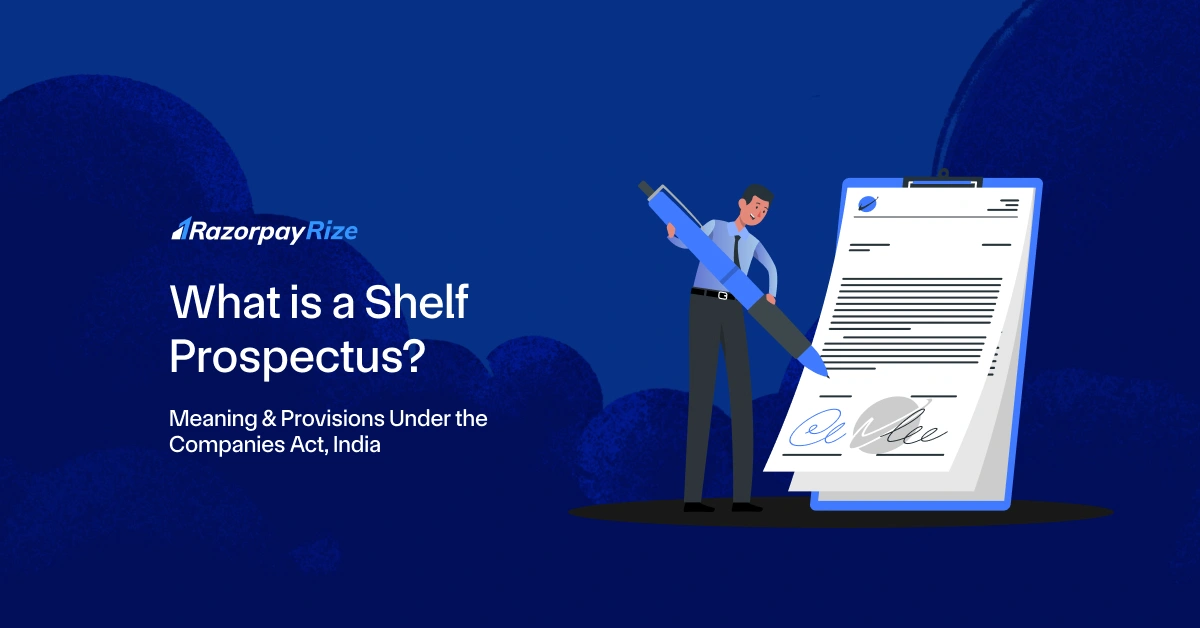A Digital Signature Certificate (DSC) is a secure digital key issued by a trusted authority, known as a Certificate Authority (CA), that is used to authenticate the identity of individuals, organizations, or devices in the digital world.
It is a digital equivalent of a handwritten signature or a stamped seal, providing assurance of the signer's identity and the integrity of the signed document or message. In general, a DSC includes details such as name, postal code, country, email address, certificate issuance date, and the name of the certifying authority.
In this blog, we'll explore the significance of DSCs, the process of applying for them in India, and their key features.
Table of Contents
Importance of a Digital Signature Certificate
The importance of a Digital Signature Certificate (DSC) lies in its ability to provide strong authentication, integrity, and proper encryptions in digital transactions and communications.

Here are several key reasons why DSCs are important and why you should apply for one as a founder:
1. Authentication
- DSCs verify the identity of individuals, organizations, or devices involved in digital transactions, ensuring that the sender is who they claim to be.
2. Integrity
- Digital signatures created using DSCs ensure the integrity of electronic documents or messages by detecting any unauthorized changes or tampering.
3. Security
- DSCs use strong cryptographic techniques to protect sensitive information and prevent unauthorized access.
4. Legal Recognition
- In India, many industries and regulatory frameworks require the use of DSCs for specific types of transactions or communications to comply with security and privacy regulations.
5. Government Services
- DSCs play an important role in the company registration process irrespective of the company type. Accessing government services, filing tax returns, or participating in e-tendering processes require digital signatures for authentication and authorization.
6. Efficiency
- DSCs streamline digital workflows by enabling secure and paperless transactions without the physical presence.
Overall, DSCs offer numerous benefits, including enhanced security, legal validity, efficiency, and cost savings, making them indispensable for digital transactions and communications
Different Classes of Digital Signature Certificates (DSCs)
Certifying authorities issue 3 types of DSCs to accommodate various needs and purposes.The type of applicant and the intended use of the Digital Signature Certificate determine the specific kind of DSC that should be sought based on the requirements.
Class 1 DSC:
- These certificates are issued for individuals or private users and are primarily used for email communication and basic transactions.
- Verification requirements are minimal, typically involving email validation or verification of basic personal information.
Class 2 DSC:
- Class 2 certificates are used for both individual and organizational purposes and offer a higher level of security and trust compared to Class 1.
- To obtain a Class 2 DSC, the applicant's identity is verified against a trusted government-issued identity document, such as a passport or driver's license.
Class 3 DSC:
- Class 3 certificates provide the highest level of security and are typically used for online transactions involving high-value financial transactions, e-commerce, and government applications.
- The verification process for Class 3 DSCs involves rigorous identity verification procedures, including in-person verification and submission of supporting documents.
Certifying Authorities in India
Certifying Agencies are designated by the office of the Controller of Certification Agencies (CCA) in accordance with the provisions of the IT Act, 2000. Currently, there are eight Certification Agencies authorized by the CCA to issue Digital Signature Certificates (DSCs).

Format of a Digital Signature Certificate
A DSC typically contains the following components:
1. Public Key
- A cryptographic key that is made publicly available and used to verify digital signatures created by the corresponding private key.
2. Private Key
- A secret key that is securely held by the owner and used to create digital signatures for documents or messages.
3. Certificate Information
- Details about the certificate, including the issuer (Certifying Authority), the validity period, a unique identifier, the subject (owner), and the digital signature of the CA to confirm its authenticity.
4. Digital Signature
- A unique digital signature generated using the private key of the certificate, which can be verified using the corresponding public key.
The format of a Digital Signature Certificate (DSC) can vary depending on the issuing Certificate Authority (CA) and the type and class of the certificate.
Documents required for obtaining a Digital Signature Certificate
The documents required for obtaining a Digital Signature Certificate (DSC) include:
- Proof of Identity: Copy of any one of the following government-issued identity documents attested by a Gazetted officer:
• Passport
• Aadhaar Card
• PAN Card
• Voter ID Card - Proof of Address: Copy of any one of the following documents showing the applicant's residential address attested by a Gazetted officer:
• Utility bill (electricity, water, gas, telephone)
• Bank statement
• Rent agreement - Passport Size Photograph: Recent passport-size color photograph of the applicant.
- Self-attested Copy of PAN Card: A self-attested photocopy of the applicant's PAN Card.
- Organization Documents (if applicable):For organizations, additional documents such as the Certificate of Incorporation, Memorandum of Association (MOA), Articles of Association (AOA), or Partnership Deed may be required.
It's important to note that the specific documents required may vary depending on the type of Digital Signature Certificate (e.g., Class 1, Class 2, Class 3), the Certification Authority (CA) issuing the certificate, and the purpose for which the certificate is being obtained.
How to apply for a Digital Signature Certificate?
Razorpay Rize simplifies this process by streamlining e-filing on the MCA portal (company registration process), and as part of the package, you can acquire 2 Digital Signature Certificates for the involved directors/partners.
Note: It's necessary to obtain a Digital Signature Certificate (DSC) of either the Class 2 or Class 3 signing certificate category issued by a licensed Certifying Authority (CA) to facilitate e-filing on the MCA Portal for company registration processes.
Alternatively, you also have the option to apply for DSCs through designated certifying agencies through the following steps.
- Choose a Certifying Authority (CA) accredited by the Controller of Certification Agencies (CCA) under the provisions of the IT Act, 2000.
- Determine the type and class of DSC required based on your needs and the level of security required (e.g., Class 1, Class 2, Class 3).
- Gather the necessary documents, including proof of identity, proof of address, passport-size photograph, self-attested copy of PAN card, and any organization-related documents (if applicable).
- Obtain and fill out the DSC application form provided by the chosen Certifying Authority. Fill in the necessary details like the Class of the DSC, validity, type, applicant name and details, residential address, etc.
- Undergo the identity verification process as per the CA's requirements, which may involve in-person verification or online verification, depending on the type of DSC and the CA's policies.
- Pay the prescribed fees.
- Upon successful verification and payment, the Certifying Authority will generate a unique key pair consisting of a public key and a corresponding private key.
- Once the key pair is generated, the Certifying Authority will issue the Digital Signature Certificate.
- Install the DSC on the appropriate device or token as per the CA's instructions.
Validity of the Digital Signature Certificate
Digital Signature Certificates (DSCs) are commonly issued with either a one-year validity or a two-year validity period.
These certificates can be renewed upon expiry of the initial validity period. Renewal procedures typically involve submitting updated documentation and undergoing identity verification processes, similar to the initial application process.
Fees for the Digital Signature Certificate in India
If you’re registering your business with Razorpay Rize, DSCs are commonly included in the package regardless of the company type.
In the case of direct applications, the fees include various components, including the one-time cost of the medium (such as a USB token), the Digital Signature Certificate (DSC) issuance cost, the renewal cost after the validity period expires, and the support costs (if any).
The costs, as mentioned on the MCA website, are as follows-
Frequently Asked Questions
Private Limited Company
(Pvt. Ltd.)
- Service-based businesses
- Businesses looking to issue shares
- Businesses seeking investment through equity-based funding
Limited Liability Partnership
(LLP)
- Professional services
- Firms seeking any capital contribution from Partners
- Firms sharing resources with limited liability
One Person Company
(OPC)
- Freelancers, Small-scale businesses
- Businesses looking for minimal compliance
- Businesses looking for single-ownership
Private Limited Company
(Pvt. Ltd.)
- Service-based businesses
- Businesses looking to issue shares
- Businesses seeking investment through equity-based funding
One Person Company
(OPC)
- Freelancers, Small-scale businesses
- Businesses looking for minimal compliance
- Businesses looking for single-ownership
Private Limited Company
(Pvt. Ltd.)
- Service-based businesses
- Businesses looking to issue shares
- Businesses seeking investment through equity-based funding
Limited Liability Partnership
(LLP)
- Professional services
- Firms seeking any capital contribution from Partners
- Firms sharing resources with limited liability
Frequently Asked Questions
Is there a difference between a digital signature and a DSC?
Yes, a digital signature refers to the cryptographic technique used to sign electronic documents, while a DSC is the digital certificate that contains a digital signature key pair and is used to verify the signer's identity.
What are the different types of DSCs valid during Company registration?
The different types of Digital Signature Certificates currently valid during company registration are class 2 and class 3 types.
Is a Director Identification Number (DIN) required to apply for DSC?
No, you can apply for a DSC without the DIN with supported documents as mentioned in the above sections
How can I check the validity of a DSC?
To check the validity of a Digital Signature Certificate (DSC), you can follow these steps:
- Access the different USB token tools that are currently available.
- Login & enter the token password when prompted.
- Select your certificate name from the list.
- Once selected, the certificate will open. Navigate to the ‘Details’ tab, where you will find comprehensive information about your certificate, including its validity details.
.webp)















